Corporate Law: Analysis of Bonus Share Issues and Shareholder Rights
VerifiedAdded on 2020/02/05
|9
|2451
|39
Report
AI Summary
This report analyzes a corporate law scenario involving Waldmart Ltd's proposal to issue bonus shares and increase dividends, sparking disagreement from a shareholder, Jim Smith. The report examines the company's rights under its constitution, the role of shareholders, and the implications of the Companies Act 2013. It explores shareholder rights, including the ability to influence decisions like dividend increases and the consequences of voting against remuneration reports. The analysis covers legal precedents and the potential outcomes for Waldmart and its directors, highlighting the significance of shareholder resolutions and adherence to corporate governance principles.
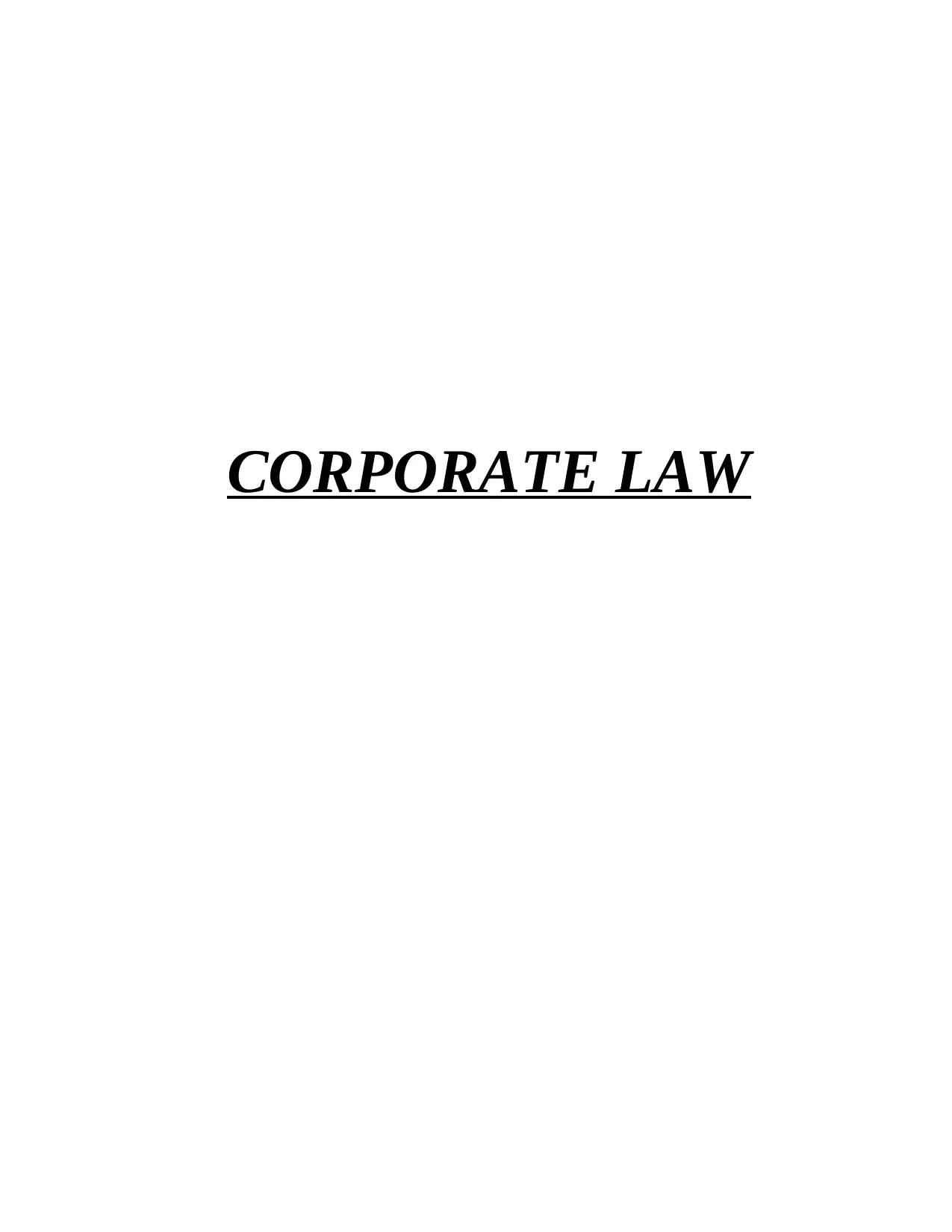
CORPORATE LAW
Paraphrase This Document
Need a fresh take? Get an instant paraphrase of this document with our AI Paraphraser
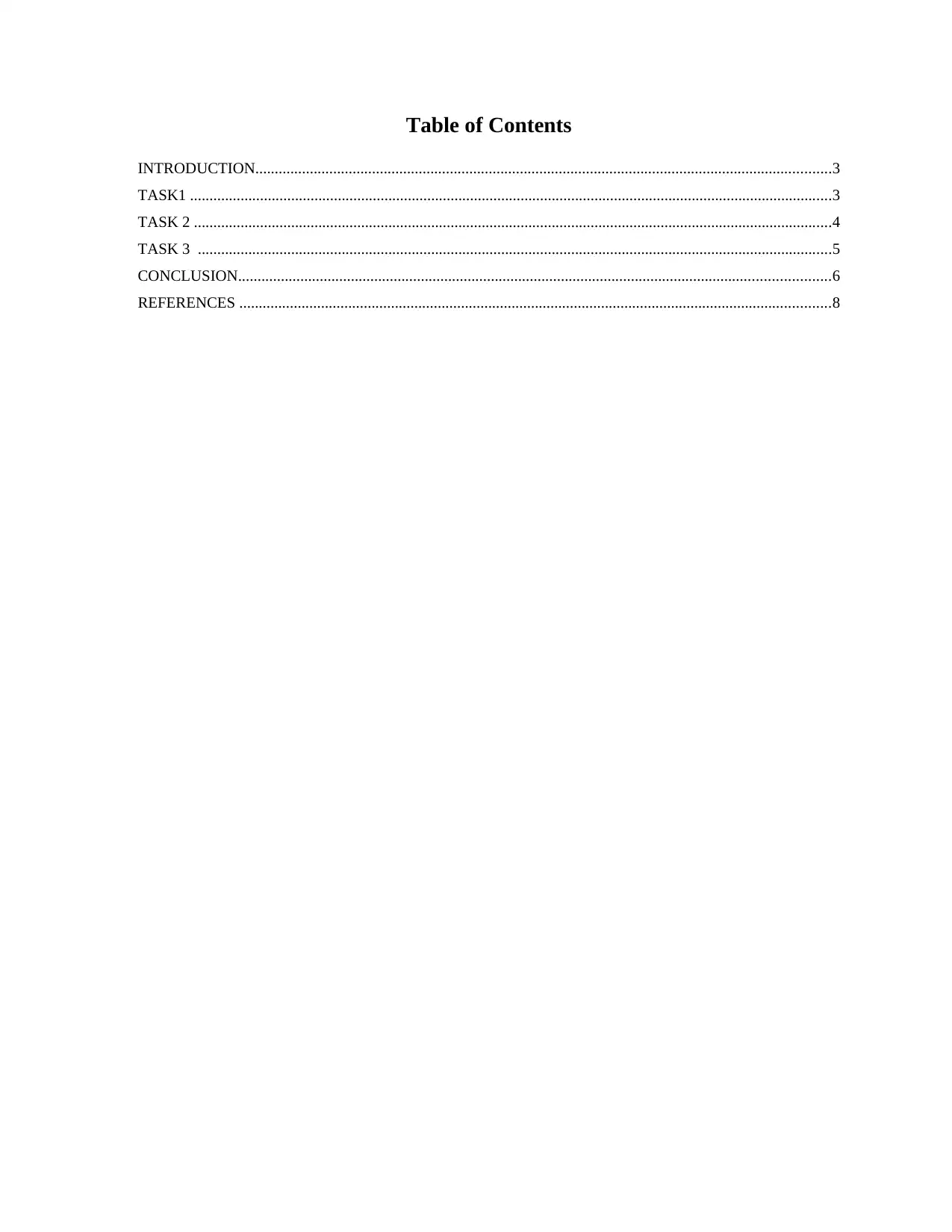
Table of Contents
INTRODUCTION....................................................................................................................................................3
TASK1 .....................................................................................................................................................................3
TASK 2 ....................................................................................................................................................................4
TASK 3 ...................................................................................................................................................................5
CONCLUSION........................................................................................................................................................6
REFERENCES ........................................................................................................................................................8
INTRODUCTION....................................................................................................................................................3
TASK1 .....................................................................................................................................................................3
TASK 2 ....................................................................................................................................................................4
TASK 3 ...................................................................................................................................................................5
CONCLUSION........................................................................................................................................................6
REFERENCES ........................................................................................................................................................8
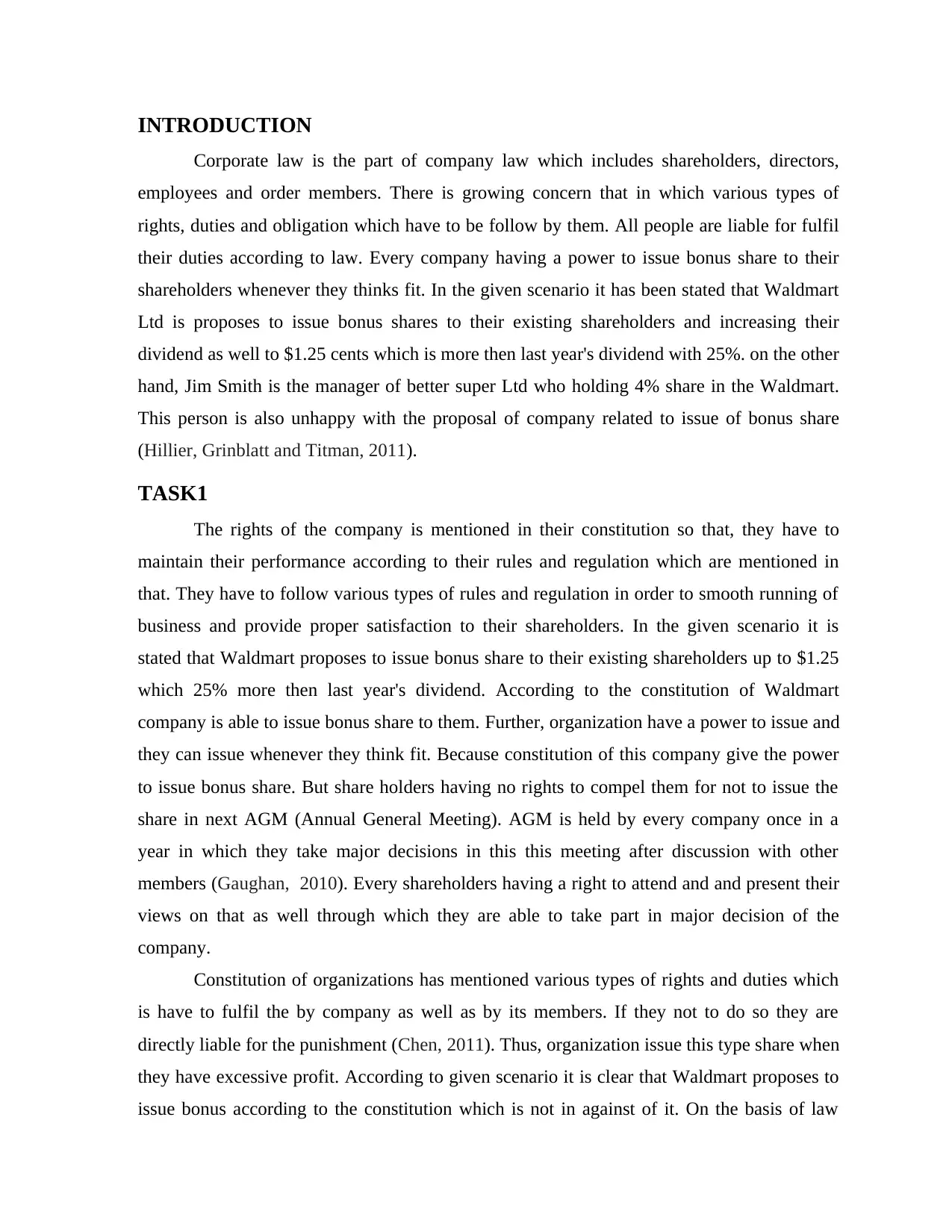
INTRODUCTION
Corporate law is the part of company law which includes shareholders, directors,
employees and order members. There is growing concern that in which various types of
rights, duties and obligation which have to be follow by them. All people are liable for fulfil
their duties according to law. Every company having a power to issue bonus share to their
shareholders whenever they thinks fit. In the given scenario it has been stated that Waldmart
Ltd is proposes to issue bonus shares to their existing shareholders and increasing their
dividend as well to $1.25 cents which is more then last year's dividend with 25%. on the other
hand, Jim Smith is the manager of better super Ltd who holding 4% share in the Waldmart.
This person is also unhappy with the proposal of company related to issue of bonus share
(Hillier, Grinblatt and Titman, 2011).
TASK1
The rights of the company is mentioned in their constitution so that, they have to
maintain their performance according to their rules and regulation which are mentioned in
that. They have to follow various types of rules and regulation in order to smooth running of
business and provide proper satisfaction to their shareholders. In the given scenario it is
stated that Waldmart proposes to issue bonus share to their existing shareholders up to $1.25
which 25% more then last year's dividend. According to the constitution of Waldmart
company is able to issue bonus share to them. Further, organization have a power to issue and
they can issue whenever they think fit. Because constitution of this company give the power
to issue bonus share. But share holders having no rights to compel them for not to issue the
share in next AGM (Annual General Meeting). AGM is held by every company once in a
year in which they take major decisions in this this meeting after discussion with other
members (Gaughan, 2010). Every shareholders having a right to attend and and present their
views on that as well through which they are able to take part in major decision of the
company.
Constitution of organizations has mentioned various types of rights and duties which
is have to fulfil the by company as well as by its members. If they not to do so they are
directly liable for the punishment (Chen, 2011). Thus, organization issue this type share when
they have excessive profit. According to given scenario it is clear that Waldmart proposes to
issue bonus according to the constitution which is not in against of it. On the basis of law
Corporate law is the part of company law which includes shareholders, directors,
employees and order members. There is growing concern that in which various types of
rights, duties and obligation which have to be follow by them. All people are liable for fulfil
their duties according to law. Every company having a power to issue bonus share to their
shareholders whenever they thinks fit. In the given scenario it has been stated that Waldmart
Ltd is proposes to issue bonus shares to their existing shareholders and increasing their
dividend as well to $1.25 cents which is more then last year's dividend with 25%. on the other
hand, Jim Smith is the manager of better super Ltd who holding 4% share in the Waldmart.
This person is also unhappy with the proposal of company related to issue of bonus share
(Hillier, Grinblatt and Titman, 2011).
TASK1
The rights of the company is mentioned in their constitution so that, they have to
maintain their performance according to their rules and regulation which are mentioned in
that. They have to follow various types of rules and regulation in order to smooth running of
business and provide proper satisfaction to their shareholders. In the given scenario it is
stated that Waldmart proposes to issue bonus share to their existing shareholders up to $1.25
which 25% more then last year's dividend. According to the constitution of Waldmart
company is able to issue bonus share to them. Further, organization have a power to issue and
they can issue whenever they think fit. Because constitution of this company give the power
to issue bonus share. But share holders having no rights to compel them for not to issue the
share in next AGM (Annual General Meeting). AGM is held by every company once in a
year in which they take major decisions in this this meeting after discussion with other
members (Gaughan, 2010). Every shareholders having a right to attend and and present their
views on that as well through which they are able to take part in major decision of the
company.
Constitution of organizations has mentioned various types of rights and duties which
is have to fulfil the by company as well as by its members. If they not to do so they are
directly liable for the punishment (Chen, 2011). Thus, organization issue this type share when
they have excessive profit. According to given scenario it is clear that Waldmart proposes to
issue bonus according to the constitution which is not in against of it. On the basis of law
⊘ This is a preview!⊘
Do you want full access?
Subscribe today to unlock all pages.

Trusted by 1+ million students worldwide
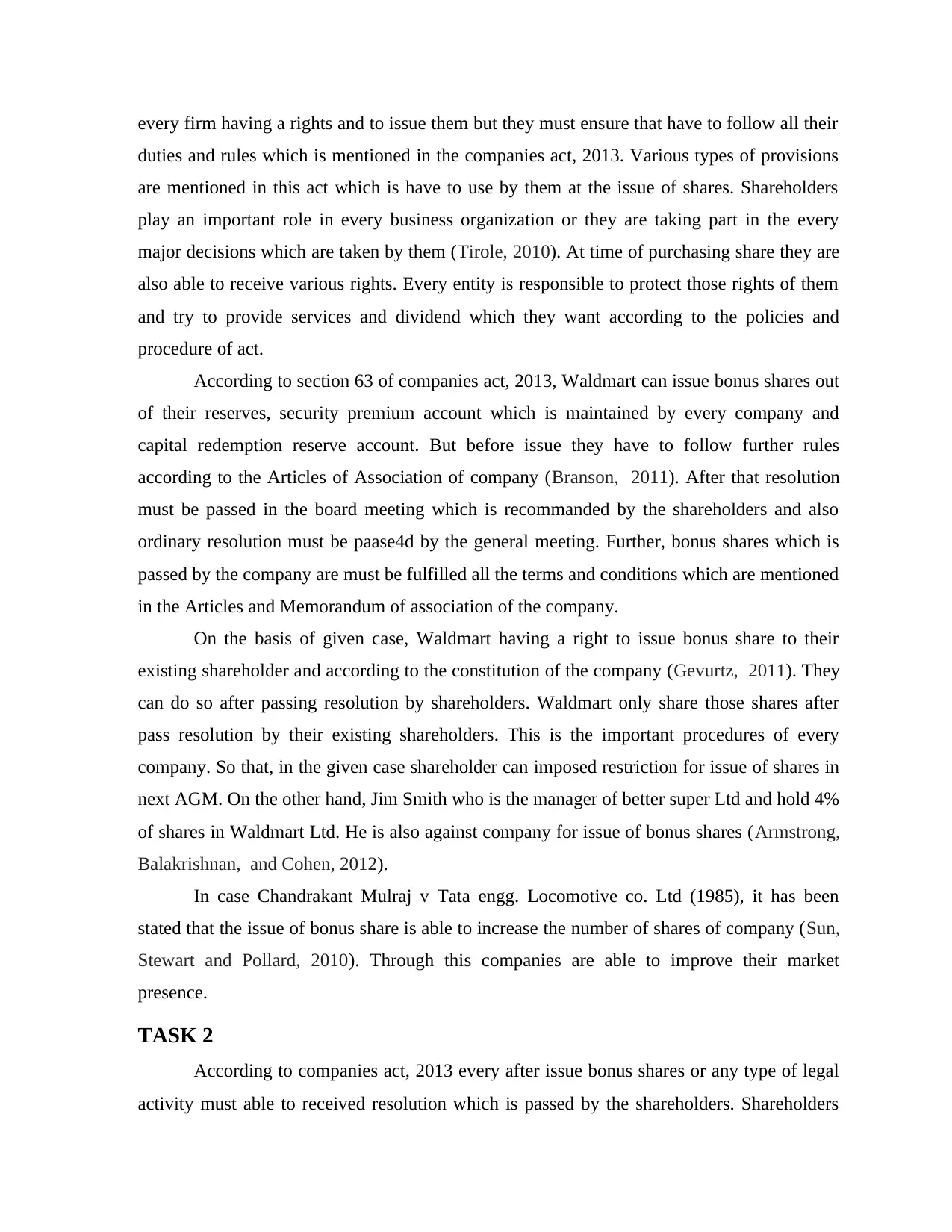
every firm having a rights and to issue them but they must ensure that have to follow all their
duties and rules which is mentioned in the companies act, 2013. Various types of provisions
are mentioned in this act which is have to use by them at the issue of shares. Shareholders
play an important role in every business organization or they are taking part in the every
major decisions which are taken by them (Tirole, 2010). At time of purchasing share they are
also able to receive various rights. Every entity is responsible to protect those rights of them
and try to provide services and dividend which they want according to the policies and
procedure of act.
According to section 63 of companies act, 2013, Waldmart can issue bonus shares out
of their reserves, security premium account which is maintained by every company and
capital redemption reserve account. But before issue they have to follow further rules
according to the Articles of Association of company (Branson, 2011). After that resolution
must be passed in the board meeting which is recommanded by the shareholders and also
ordinary resolution must be paase4d by the general meeting. Further, bonus shares which is
passed by the company are must be fulfilled all the terms and conditions which are mentioned
in the Articles and Memorandum of association of the company.
On the basis of given case, Waldmart having a right to issue bonus share to their
existing shareholder and according to the constitution of the company (Gevurtz, 2011). They
can do so after passing resolution by shareholders. Waldmart only share those shares after
pass resolution by their existing shareholders. This is the important procedures of every
company. So that, in the given case shareholder can imposed restriction for issue of shares in
next AGM. On the other hand, Jim Smith who is the manager of better super Ltd and hold 4%
of shares in Waldmart Ltd. He is also against company for issue of bonus shares (Armstrong,
Balakrishnan, and Cohen, 2012).
In case Chandrakant Mulraj v Tata engg. Locomotive co. Ltd (1985), it has been
stated that the issue of bonus share is able to increase the number of shares of company (Sun,
Stewart and Pollard, 2010). Through this companies are able to improve their market
presence.
TASK 2
According to companies act, 2013 every after issue bonus shares or any type of legal
activity must able to received resolution which is passed by the shareholders. Shareholders
duties and rules which is mentioned in the companies act, 2013. Various types of provisions
are mentioned in this act which is have to use by them at the issue of shares. Shareholders
play an important role in every business organization or they are taking part in the every
major decisions which are taken by them (Tirole, 2010). At time of purchasing share they are
also able to receive various rights. Every entity is responsible to protect those rights of them
and try to provide services and dividend which they want according to the policies and
procedure of act.
According to section 63 of companies act, 2013, Waldmart can issue bonus shares out
of their reserves, security premium account which is maintained by every company and
capital redemption reserve account. But before issue they have to follow further rules
according to the Articles of Association of company (Branson, 2011). After that resolution
must be passed in the board meeting which is recommanded by the shareholders and also
ordinary resolution must be paase4d by the general meeting. Further, bonus shares which is
passed by the company are must be fulfilled all the terms and conditions which are mentioned
in the Articles and Memorandum of association of the company.
On the basis of given case, Waldmart having a right to issue bonus share to their
existing shareholder and according to the constitution of the company (Gevurtz, 2011). They
can do so after passing resolution by shareholders. Waldmart only share those shares after
pass resolution by their existing shareholders. This is the important procedures of every
company. So that, in the given case shareholder can imposed restriction for issue of shares in
next AGM. On the other hand, Jim Smith who is the manager of better super Ltd and hold 4%
of shares in Waldmart Ltd. He is also against company for issue of bonus shares (Armstrong,
Balakrishnan, and Cohen, 2012).
In case Chandrakant Mulraj v Tata engg. Locomotive co. Ltd (1985), it has been
stated that the issue of bonus share is able to increase the number of shares of company (Sun,
Stewart and Pollard, 2010). Through this companies are able to improve their market
presence.
TASK 2
According to companies act, 2013 every after issue bonus shares or any type of legal
activity must able to received resolution which is passed by the shareholders. Shareholders
Paraphrase This Document
Need a fresh take? Get an instant paraphrase of this document with our AI Paraphraser
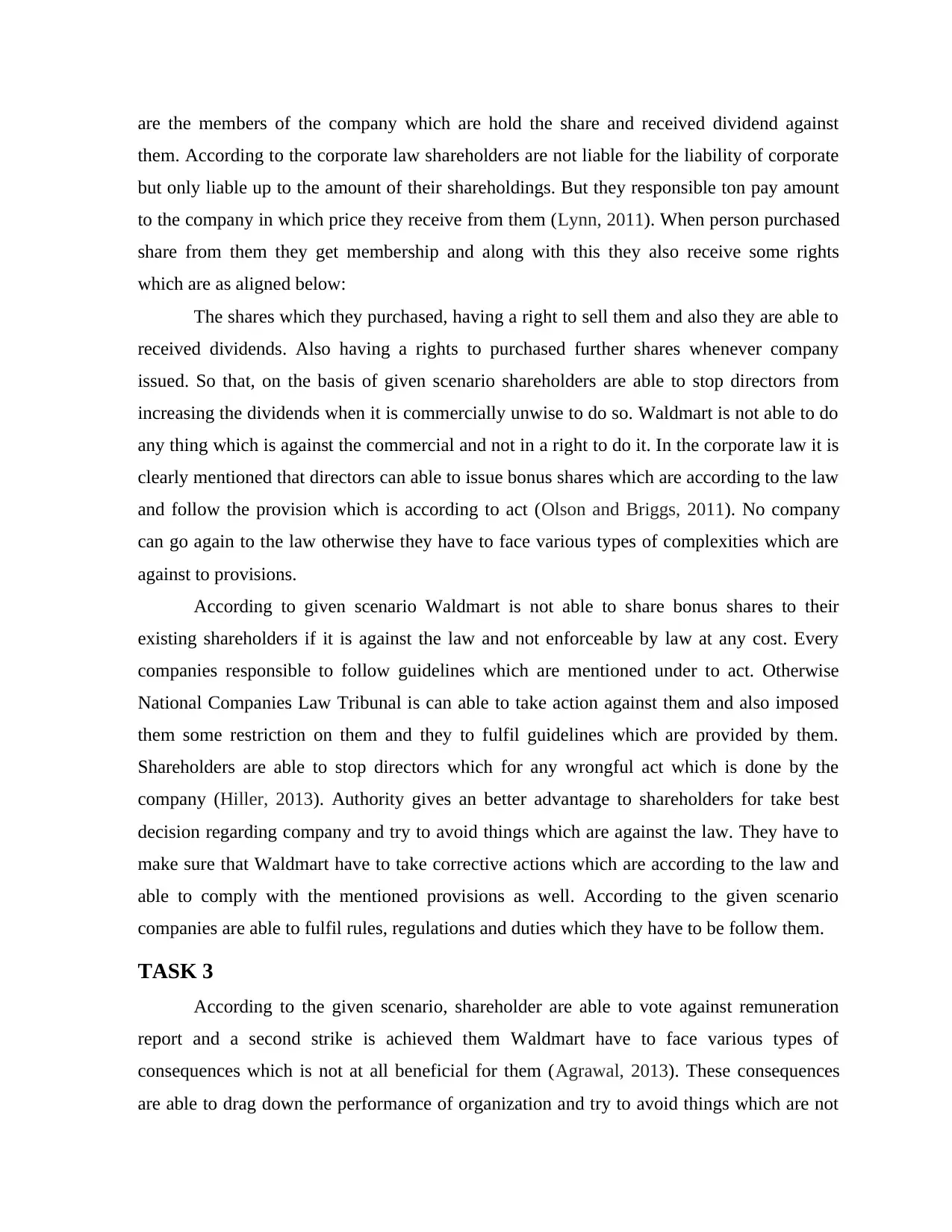
are the members of the company which are hold the share and received dividend against
them. According to the corporate law shareholders are not liable for the liability of corporate
but only liable up to the amount of their shareholdings. But they responsible ton pay amount
to the company in which price they receive from them (Lynn, 2011). When person purchased
share from them they get membership and along with this they also receive some rights
which are as aligned below:
The shares which they purchased, having a right to sell them and also they are able to
received dividends. Also having a rights to purchased further shares whenever company
issued. So that, on the basis of given scenario shareholders are able to stop directors from
increasing the dividends when it is commercially unwise to do so. Waldmart is not able to do
any thing which is against the commercial and not in a right to do it. In the corporate law it is
clearly mentioned that directors can able to issue bonus shares which are according to the law
and follow the provision which is according to act (Olson and Briggs, 2011). No company
can go again to the law otherwise they have to face various types of complexities which are
against to provisions.
According to given scenario Waldmart is not able to share bonus shares to their
existing shareholders if it is against the law and not enforceable by law at any cost. Every
companies responsible to follow guidelines which are mentioned under to act. Otherwise
National Companies Law Tribunal is can able to take action against them and also imposed
them some restriction on them and they to fulfil guidelines which are provided by them.
Shareholders are able to stop directors which for any wrongful act which is done by the
company (Hiller, 2013). Authority gives an better advantage to shareholders for take best
decision regarding company and try to avoid things which are against the law. They have to
make sure that Waldmart have to take corrective actions which are according to the law and
able to comply with the mentioned provisions as well. According to the given scenario
companies are able to fulfil rules, regulations and duties which they have to be follow them.
TASK 3
According to the given scenario, shareholder are able to vote against remuneration
report and a second strike is achieved them Waldmart have to face various types of
consequences which is not at all beneficial for them (Agrawal, 2013). These consequences
are able to drag down the performance of organization and try to avoid things which are not
them. According to the corporate law shareholders are not liable for the liability of corporate
but only liable up to the amount of their shareholdings. But they responsible ton pay amount
to the company in which price they receive from them (Lynn, 2011). When person purchased
share from them they get membership and along with this they also receive some rights
which are as aligned below:
The shares which they purchased, having a right to sell them and also they are able to
received dividends. Also having a rights to purchased further shares whenever company
issued. So that, on the basis of given scenario shareholders are able to stop directors from
increasing the dividends when it is commercially unwise to do so. Waldmart is not able to do
any thing which is against the commercial and not in a right to do it. In the corporate law it is
clearly mentioned that directors can able to issue bonus shares which are according to the law
and follow the provision which is according to act (Olson and Briggs, 2011). No company
can go again to the law otherwise they have to face various types of complexities which are
against to provisions.
According to given scenario Waldmart is not able to share bonus shares to their
existing shareholders if it is against the law and not enforceable by law at any cost. Every
companies responsible to follow guidelines which are mentioned under to act. Otherwise
National Companies Law Tribunal is can able to take action against them and also imposed
them some restriction on them and they to fulfil guidelines which are provided by them.
Shareholders are able to stop directors which for any wrongful act which is done by the
company (Hiller, 2013). Authority gives an better advantage to shareholders for take best
decision regarding company and try to avoid things which are against the law. They have to
make sure that Waldmart have to take corrective actions which are according to the law and
able to comply with the mentioned provisions as well. According to the given scenario
companies are able to fulfil rules, regulations and duties which they have to be follow them.
TASK 3
According to the given scenario, shareholder are able to vote against remuneration
report and a second strike is achieved them Waldmart have to face various types of
consequences which is not at all beneficial for them (Agrawal, 2013). These consequences
are able to drag down the performance of organization and try to avoid things which are not
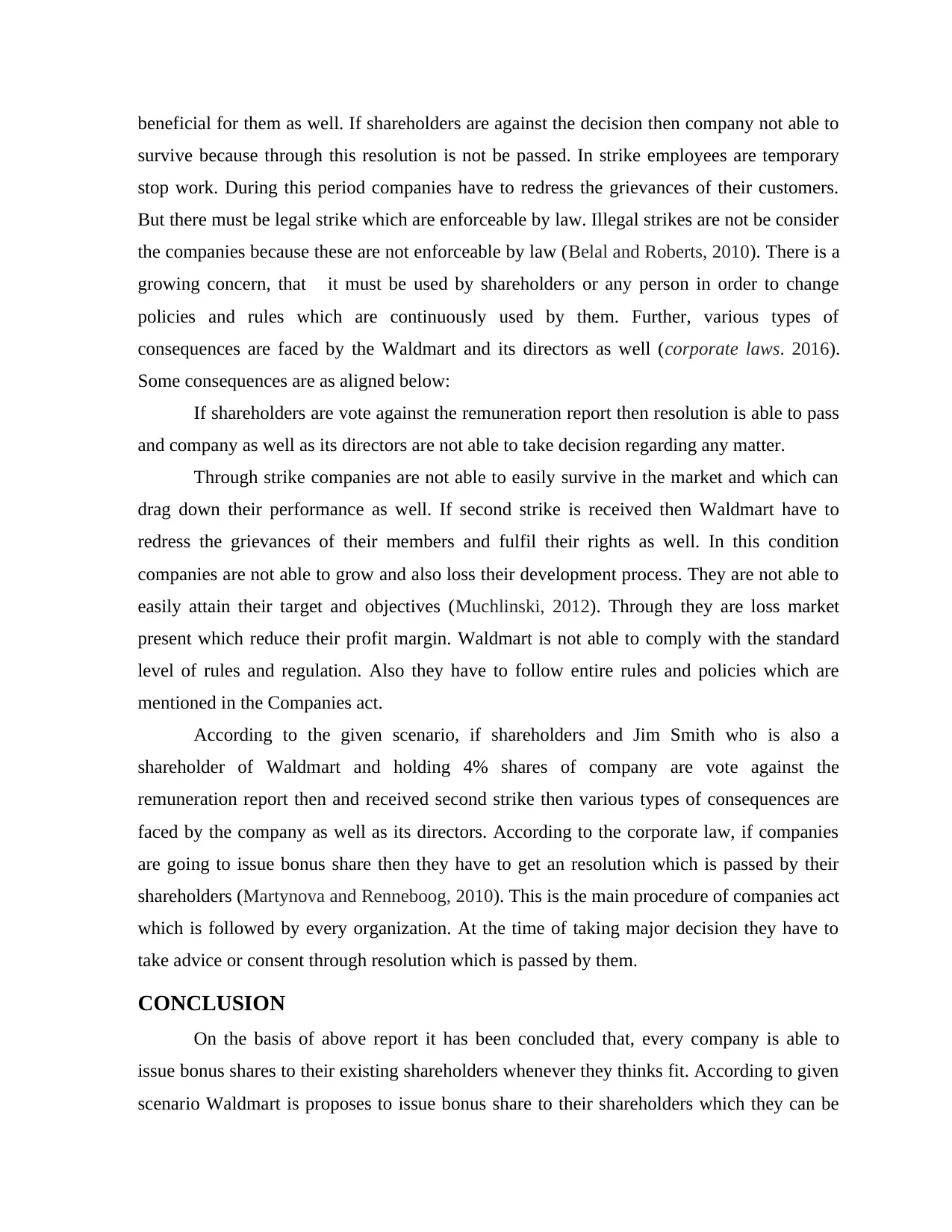
beneficial for them as well. If shareholders are against the decision then company not able to
survive because through this resolution is not be passed. In strike employees are temporary
stop work. During this period companies have to redress the grievances of their customers.
But there must be legal strike which are enforceable by law. Illegal strikes are not be consider
the companies because these are not enforceable by law (Belal and Roberts, 2010). There is a
growing concern, that it must be used by shareholders or any person in order to change
policies and rules which are continuously used by them. Further, various types of
consequences are faced by the Waldmart and its directors as well (corporate laws. 2016).
Some consequences are as aligned below:
If shareholders are vote against the remuneration report then resolution is able to pass
and company as well as its directors are not able to take decision regarding any matter.
Through strike companies are not able to easily survive in the market and which can
drag down their performance as well. If second strike is received then Waldmart have to
redress the grievances of their members and fulfil their rights as well. In this condition
companies are not able to grow and also loss their development process. They are not able to
easily attain their target and objectives (Muchlinski, 2012). Through they are loss market
present which reduce their profit margin. Waldmart is not able to comply with the standard
level of rules and regulation. Also they have to follow entire rules and policies which are
mentioned in the Companies act.
According to the given scenario, if shareholders and Jim Smith who is also a
shareholder of Waldmart and holding 4% shares of company are vote against the
remuneration report then and received second strike then various types of consequences are
faced by the company as well as its directors. According to the corporate law, if companies
are going to issue bonus share then they have to get an resolution which is passed by their
shareholders (Martynova and Renneboog, 2010). This is the main procedure of companies act
which is followed by every organization. At the time of taking major decision they have to
take advice or consent through resolution which is passed by them.
CONCLUSION
On the basis of above report it has been concluded that, every company is able to
issue bonus shares to their existing shareholders whenever they thinks fit. According to given
scenario Waldmart is proposes to issue bonus share to their shareholders which they can be
survive because through this resolution is not be passed. In strike employees are temporary
stop work. During this period companies have to redress the grievances of their customers.
But there must be legal strike which are enforceable by law. Illegal strikes are not be consider
the companies because these are not enforceable by law (Belal and Roberts, 2010). There is a
growing concern, that it must be used by shareholders or any person in order to change
policies and rules which are continuously used by them. Further, various types of
consequences are faced by the Waldmart and its directors as well (corporate laws. 2016).
Some consequences are as aligned below:
If shareholders are vote against the remuneration report then resolution is able to pass
and company as well as its directors are not able to take decision regarding any matter.
Through strike companies are not able to easily survive in the market and which can
drag down their performance as well. If second strike is received then Waldmart have to
redress the grievances of their members and fulfil their rights as well. In this condition
companies are not able to grow and also loss their development process. They are not able to
easily attain their target and objectives (Muchlinski, 2012). Through they are loss market
present which reduce their profit margin. Waldmart is not able to comply with the standard
level of rules and regulation. Also they have to follow entire rules and policies which are
mentioned in the Companies act.
According to the given scenario, if shareholders and Jim Smith who is also a
shareholder of Waldmart and holding 4% shares of company are vote against the
remuneration report then and received second strike then various types of consequences are
faced by the company as well as its directors. According to the corporate law, if companies
are going to issue bonus share then they have to get an resolution which is passed by their
shareholders (Martynova and Renneboog, 2010). This is the main procedure of companies act
which is followed by every organization. At the time of taking major decision they have to
take advice or consent through resolution which is passed by them.
CONCLUSION
On the basis of above report it has been concluded that, every company is able to
issue bonus shares to their existing shareholders whenever they thinks fit. According to given
scenario Waldmart is proposes to issue bonus share to their shareholders which they can be
⊘ This is a preview!⊘
Do you want full access?
Subscribe today to unlock all pages.

Trusted by 1+ million students worldwide

do so because it is clearly mentioned in their constitution. If they are not giving vote to the
remuneration report. Through this companies as well as its directors are able to consequences
which are not even good for their success. Further, shareholders play an important role in
every business organization through their decision are also very important them which they
provide through resolution which is passed by them.
remuneration report. Through this companies as well as its directors are able to consequences
which are not even good for their success. Further, shareholders play an important role in
every business organization through their decision are also very important them which they
provide through resolution which is passed by them.
Paraphrase This Document
Need a fresh take? Get an instant paraphrase of this document with our AI Paraphraser
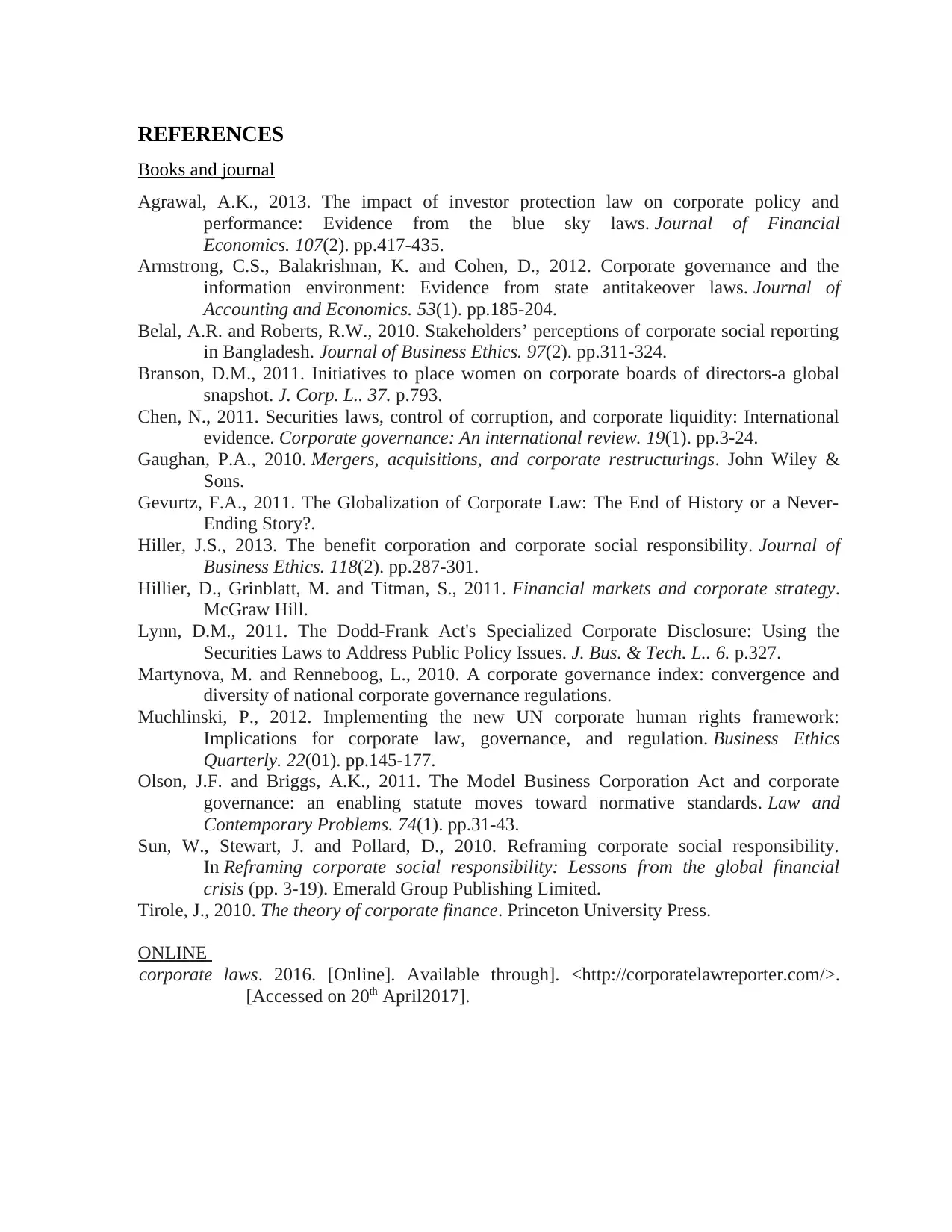
REFERENCES
Books and journal
Agrawal, A.K., 2013. The impact of investor protection law on corporate policy and
performance: Evidence from the blue sky laws. Journal of Financial
Economics. 107(2). pp.417-435.
Armstrong, C.S., Balakrishnan, K. and Cohen, D., 2012. Corporate governance and the
information environment: Evidence from state antitakeover laws. Journal of
Accounting and Economics. 53(1). pp.185-204.
Belal, A.R. and Roberts, R.W., 2010. Stakeholders’ perceptions of corporate social reporting
in Bangladesh. Journal of Business Ethics. 97(2). pp.311-324.
Branson, D.M., 2011. Initiatives to place women on corporate boards of directors-a global
snapshot. J. Corp. L.. 37. p.793.
Chen, N., 2011. Securities laws, control of corruption, and corporate liquidity: International
evidence. Corporate governance: An international review. 19(1). pp.3-24.
Gaughan, P.A., 2010. Mergers, acquisitions, and corporate restructurings. John Wiley &
Sons.
Gevurtz, F.A., 2011. The Globalization of Corporate Law: The End of History or a Never-
Ending Story?.
Hiller, J.S., 2013. The benefit corporation and corporate social responsibility. Journal of
Business Ethics. 118(2). pp.287-301.
Hillier, D., Grinblatt, M. and Titman, S., 2011. Financial markets and corporate strategy.
McGraw Hill.
Lynn, D.M., 2011. The Dodd-Frank Act's Specialized Corporate Disclosure: Using the
Securities Laws to Address Public Policy Issues. J. Bus. & Tech. L.. 6. p.327.
Martynova, M. and Renneboog, L., 2010. A corporate governance index: convergence and
diversity of national corporate governance regulations.
Muchlinski, P., 2012. Implementing the new UN corporate human rights framework:
Implications for corporate law, governance, and regulation. Business Ethics
Quarterly. 22(01). pp.145-177.
Olson, J.F. and Briggs, A.K., 2011. The Model Business Corporation Act and corporate
governance: an enabling statute moves toward normative standards. Law and
Contemporary Problems. 74(1). pp.31-43.
Sun, W., Stewart, J. and Pollard, D., 2010. Reframing corporate social responsibility.
In Reframing corporate social responsibility: Lessons from the global financial
crisis (pp. 3-19). Emerald Group Publishing Limited.
Tirole, J., 2010. The theory of corporate finance. Princeton University Press.
ONLINE
corporate laws. 2016. [Online]. Available through]. <http://corporatelawreporter.com/>.
[Accessed on 20th April2017].
Books and journal
Agrawal, A.K., 2013. The impact of investor protection law on corporate policy and
performance: Evidence from the blue sky laws. Journal of Financial
Economics. 107(2). pp.417-435.
Armstrong, C.S., Balakrishnan, K. and Cohen, D., 2012. Corporate governance and the
information environment: Evidence from state antitakeover laws. Journal of
Accounting and Economics. 53(1). pp.185-204.
Belal, A.R. and Roberts, R.W., 2010. Stakeholders’ perceptions of corporate social reporting
in Bangladesh. Journal of Business Ethics. 97(2). pp.311-324.
Branson, D.M., 2011. Initiatives to place women on corporate boards of directors-a global
snapshot. J. Corp. L.. 37. p.793.
Chen, N., 2011. Securities laws, control of corruption, and corporate liquidity: International
evidence. Corporate governance: An international review. 19(1). pp.3-24.
Gaughan, P.A., 2010. Mergers, acquisitions, and corporate restructurings. John Wiley &
Sons.
Gevurtz, F.A., 2011. The Globalization of Corporate Law: The End of History or a Never-
Ending Story?.
Hiller, J.S., 2013. The benefit corporation and corporate social responsibility. Journal of
Business Ethics. 118(2). pp.287-301.
Hillier, D., Grinblatt, M. and Titman, S., 2011. Financial markets and corporate strategy.
McGraw Hill.
Lynn, D.M., 2011. The Dodd-Frank Act's Specialized Corporate Disclosure: Using the
Securities Laws to Address Public Policy Issues. J. Bus. & Tech. L.. 6. p.327.
Martynova, M. and Renneboog, L., 2010. A corporate governance index: convergence and
diversity of national corporate governance regulations.
Muchlinski, P., 2012. Implementing the new UN corporate human rights framework:
Implications for corporate law, governance, and regulation. Business Ethics
Quarterly. 22(01). pp.145-177.
Olson, J.F. and Briggs, A.K., 2011. The Model Business Corporation Act and corporate
governance: an enabling statute moves toward normative standards. Law and
Contemporary Problems. 74(1). pp.31-43.
Sun, W., Stewart, J. and Pollard, D., 2010. Reframing corporate social responsibility.
In Reframing corporate social responsibility: Lessons from the global financial
crisis (pp. 3-19). Emerald Group Publishing Limited.
Tirole, J., 2010. The theory of corporate finance. Princeton University Press.
ONLINE
corporate laws. 2016. [Online]. Available through]. <http://corporatelawreporter.com/>.
[Accessed on 20th April2017].

⊘ This is a preview!⊘
Do you want full access?
Subscribe today to unlock all pages.

Trusted by 1+ million students worldwide
1 out of 9
Related Documents
Your All-in-One AI-Powered Toolkit for Academic Success.
+13062052269
info@desklib.com
Available 24*7 on WhatsApp / Email
![[object Object]](/_next/static/media/star-bottom.7253800d.svg)
Unlock your academic potential
Copyright © 2020–2026 A2Z Services. All Rights Reserved. Developed and managed by ZUCOL.




